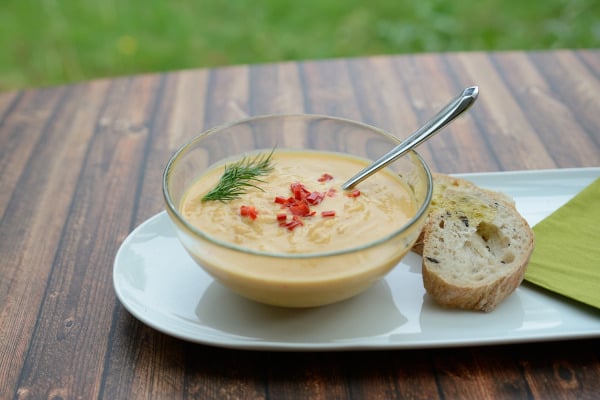Are you a BBQ sauce lover who needs to maintain a gluten-free diet? If so, you might be wondering if your favorite saucy condiment is safe for consumption or if there’s a risk it could contain hidden gluten.
In this blog post, we’ll explore the world of barbecue sauce and its relationship with gluten, examining common ingredients and discussing how to enjoy delicious BBQ flavors without sacrificing your health.
Key Takeaways
- Gluten is a protein found in wheat, barley, and rye that can harm people with celiac disease or non-celiac gluten sensitivity.
- Many BBQ sauces contain gluten, making it important to read labels carefully and research brands and manufacturers before purchasing.
- Common ingredients like barley-based malt or beer, soy sauce, bourbon, modified food starch, hydrolyzed vegetable protein (HVP), and caramel coloring could contain gluten.
- Homemade BBQ sauce can be made without any hidden sources of gluten by checking the ingredient lists of your spices and other components used in the recipe.
Understanding Gluten And Its Impacts On Health
Gluten is a protein found in grains like wheat, barley, and rye that can cause harm to people with celiac disease and non-celiac gluten sensitivity.
What Is Gluten?
Gluten is a protein found in wheat, barley, and rye that acts as a binder in foods.
While most people have no issues consuming gluten, individuals with celiac disease or non-celiac gluten sensitivity may experience adverse reactions like digestive discomfort, fatigue, and skin rashes when consuming foods containing gluten.
The Celiac Disease And Non-Celiac Gluten Sensitivity Connection
Celiac disease and non-celiac gluten sensitivity are triggered by consuming gluten, causing damage to the small intestine’s lining in autoimmune disorder sufferers.
Non-celiac gluten sensitivity is less severe but still causes uncomfortable symptoms like gas or bloating, fatigue, and headaches.
Both require a gluten-free diet, with hidden additives in commonly consumed foods like BBQ sauce needing careful monitoring.
Gluten In BBQ Sauce And Its Potential Risks
Many BBQ sauces contain gluten, which can pose a risk to those with celiac disease or non-celiac gluten sensitivity. Learn about common ingredients to watch out for and the importance of reading labels carefully to ensure your BBQ sauce is safe and gluten-free.
Common Ingredients And Additives To Watch Out For
In your quest to find gluten-free BBQ sauce, it’s essential to be aware of certain ingredients and additives that may contain gluten. Here’s a list of common culprits to watch out for:
- Barley-based malt or beer: Often used as a flavoring agent in some BBQ sauces, barley contains gluten and should be avoided.
- Soy sauce: Traditional soy sauce is brewed with wheat, making it unsafe for those with gluten sensitivities but Tamari, a gluten-free alternative, can easily replace soy sauce in recipes.
- Bourbon: Although most distilled spirits are considered safe due to their distillation process removing most of the gluten proteins, some sensitive individuals may still react to bourbon-based BBQ sauces.
- Modified food starch: This thickening agent can be made from various sources, including wheat. Ensure the source is specified if it’s labeled simply as “modified food starch.”
- Hydrolyzed vegetable protein (HVP): While not always derived from wheat, HVP has the potential for gluten contamination if processed alongside wheat-based products.
- Caramel coloring: Some caramel colors are derived from barley malt syrup and therefore not suitable for those with celiac disease or non-celiac gluten sensitivity.
As an extra precautionary measure when purchasing store-bought BBQ sauces, double-check product labels for keywords like “wheat,” “rye,” “barley,” or “triticale.”
Cross-Contamination Risks
Cross-contamination is a prevalent issue for those with celiac disease or non-celiac gluten sensitivity. It occurs when a gluten-free product comes into contact with something that contains gluten, resulting in the transfer of gluten proteins.
This can happen during the production, preparation, or even serving of food items such as BBQ sauce.
It’s important to note that while some manufacturers take precautions to reduce cross-contamination risks in their facilities, others may not have dedicated lines or equipment for making only their gluten-free products.
BBQ Sauce And Gluten – What You Need To Know
When it comes to BBQ sauce and gluten, it’s important to be vigilant about the ingredients and cross-contamination risks.
Gluten-Free BBQ Sauce Options

If you’re looking for gluten-free barbecue sauce options, here are some brands and products to consider:
- Bull’s-Eye: This popular BBQ sauce brand offers several flavors that are labeled as gluten-free, including Original, Sweet Onion, and Texas Style.
- Hunt’s: Hunt’s Classic BBQ Sauce is gluten-free and can be found at many grocery stores.
- KC Masterpiece: Many of KC Masterpiece’s sauces are gluten-free, including Original, Hickory Brown Sugar, and Classic Steakhouse.
- Kraft: Kraft’s Original Barbecue Sauce is gluten-free and widely available at grocery stores.
- Lillie’s Q Hot: This artisanal brand offers a variety of BBQ sauces, rubs, and marinades that are all gluten-free.
When choosing a gluten-free BBQ sauce option, always remember to read labels carefully to ensure that there are no hidden sources of gluten in the ingredients or manufacturing process. It’s also important to note that homemade BBQ sauce can be a great option for those with dietary restrictions who want more control over what goes into their food.
Reading Labels Carefully
To ensure that you choose a gluten-free BBQ sauce, it’s essential to read labels carefully when purchasing from the store. Look for the “gluten-free” label on the product packaging or check if it contains any ingredients that may contain gluten such as wheat, barley, rye, or malt.
When checking labels of BBQ sauces at restaurants or events, don’t hesitate to ask waitstaff questions and clarify whether their products contain gluten ingredients. As previously mentioned in [IMPORTANT FACTS], condiments like soy sauce and ketchup have a high probability of containing gluten.
Researching Brands And Manufacturers
It’s crucial to research brands and manufacturers when looking for gluten-free BBQ sauce options. Look for labels that explicitly state “gluten-free” or “contains no gluten-containing ingredients.” Some popular brands like Stubb’s, Kraft, Bull’s Eye, Sweet Baby Ray’s, and Jack Daniel’s offer gluten-free BBQ sauces.
Additionally, check the company website or reach out to customer service to confirm their manufacturing processes and cross-contamination risks. It’s also helpful to read online reviews from other consumers with similar dietary restrictions before making a purchase.
Enjoying BBQ Sauce While Maintaining A Gluten-Free Diet
To enjoy BBQ sauce while maintaining a gluten-free diet, it’s crucial to make sure the restaurant or store-bought brand you’re using is indeed gluten-free by reading labels carefully and researching brands, or opting for homemade recipes.
Making Homemade Gluten Free BBQ Sauce
If you want to ensure that your BBQ sauce is gluten-free, making your own at home is a great option. Here are some steps to follow:
- Gather the ingredients you need: tomato paste, apple cider vinegar, honey or maple syrup (or another sweetener of your choice), Worcestershire sauce (double-check that it’s gluten-free), garlic powder, onion powder, smoked paprika, salt, and pepper.
- In a mixing bowl, combine all ingredients except for the salt and pepper.
- Whisk until everything is blended together smoothly.
- Taste the sauce and adjust as necessary with salt and pepper.
- Store in an airtight container in the fridge. This recipe makes about 1 cup of BBQ sauce.
Note that this recipe does not contain any sugar – many store-bought BBQ sauces are loaded with it. You can always add some if you prefer a sweeter taste. Additionally, feel free to adjust other spices to suit your preferences.
Remember that making homemade sauces allows you to control the quality of ingredients and avoid potential sources of hidden gluten.
Asking Questions When Dining Out
When dining out on a gluten-free diet, it is important to ask questions and communicate your needs clearly to the staff. Make sure to inform them of your dietary restrictions so that they can prepare or recommend suitable menu items for you.
It’s also a good idea to ask about cross-contamination risks in the kitchen, especially if you have celiac disease as even small amounts of gluten can be harmful.
Additionally, it’s worth noting that proper accommodations for those with gluten-free diets can directly impact restaurant businesses. In fact, research shows that there has been a significant increase in demand for gluten-free menus over the past few years due to more people being diagnosed with celiac disease or choosing to avoid gluten for other health reasons.
Tips For Safe Ordering
To ensure a safe dining experience when ordering BBQ sauce while maintaining a gluten-free diet, consider the following tips:
- Communicate your dietary restrictions to the server or chef and ask for their assistance in making informed choices.
- Choose a restaurant with a separate gluten-free menu or one that clearly labels gluten-free options on their regular menu.
- Avoid fried foods that may be cooked in the same oil as battered items containing gluten.
- Be cautious of sauces and marinades that may contain soy sauce or other wheat – based ingredients.
- If in doubt, opt for simple grilled meats without any added sauces or marinades and add your own gluten-free condiments at home.
By taking these precautions and conducting thorough research both at home and while dining out, it is possible to enjoy flavorful BBQ sauces without compromising a gluten-free lifestyle.
Conclusion And Additional Resources For Gluten-Free Living
In conclusion, if you’re on a gluten-free diet, it’s important to know which BBQ sauces are safe for consumption. While some brands may contain gluten and pose potential health risks, there are many options available that are free of this protein.
Always read labels carefully and research brands to ensure the ingredients meet your dietary needs. If dining out, don’t be afraid to ask questions or even bring your own sauce from home! With a little extra effort and knowledge, you can still enjoy delicious BBQ without sacrificing your health.




Leave a Reply